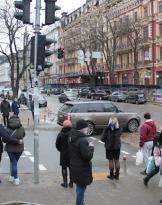Currently the commander of the Kosovo Force - KFOR, a multinational contingent made up of 28 nations, is Major General Franco Federici, a highly experienced officer with numerous missions abroad. The general is the 25th commander of the NATO mission in Kosovo.
During the recent journalistic activity embedded following the KFOR soldiers, I was able to interview him for a focus on the mission.
General, how has the UN mission changed from 1999 to today?
Over the years, as many as 22, the NATO-led Kosovo Force (KFOR) has always operated in compliance with the mandate conferred by the United Nations Security Council Resolution 1244 of 1999, namely that of guaranteeing security and freedom of movement on Kosovar territory for all the communities present. Over time - as is the case for all multinational military operations, including those led by NATO - KFOR has seen the number of personnel vary. From about 55,000 soldiers in '99 to the current 3,600 - supplied by 28 contributing countries (including both NATO member and partner countries) that offered troops to KFOR - in line with the increased level of security consolidated over time.
With the arrival of the first Latvian soldiers a few weeks ago, the number of contributing nations has risen to 28, eight of which are not members of the Alliance but adhere to the Partnership for Peace program with NATO.
 All this reflects both the continuous commitment of the Atlantic Alliance for the stability of the Western Balkans - as also underlined a few days ago by NATO Secretary General Jens Stoltenberg himself, visiting us - and the excellent collaboration and the high level of inter -operability between member countries and partners.
All this reflects both the continuous commitment of the Atlantic Alliance for the stability of the Western Balkans - as also underlined a few days ago by NATO Secretary General Jens Stoltenberg himself, visiting us - and the excellent collaboration and the high level of inter -operability between member countries and partners.
Italy, for its part, immediately participated in the KFOR mission in an important way, with a first-rate role. Both in terms of the number of national staff employed compared to the other contributing countries (Italy is currently the first contributing country to the mission), and assuming command 12 times, of which 8 in a row.
This - allow me to say - is an important and tangible testimony of the great appreciation that the national leadership continues to receive within the Alliance and from the main regional players.
It should also not be forgotten that the guide and a good part of the military of the Regional Command West (RC-W, multinational unit with responsibility in the western sector of Kosovo) and of the Multinational Specialized Unit (MSU, entirely composed of carabinieri, always employed in the urban context of the cities of Pristina and Mitrovica). The leadership of the “ISR” (Intelligence Surveillance and Reconnaissance) battalion is also Italian. In addition, of the 3.600 soldiers employed in KFOR, about 620 are Italian, with a representation of personnel belonging to all four Armed Forces.

What are the current criticalities?
After 10 months of staying in this area as KFOR commander, I feel I can positively evaluate the level of safety. There are no signs of potential risks or deterioration. That said, our units constantly used on the ground guarantee continuous monitoring and our operational posture allows us to adapt to any situation development.
Under the current internal system in Kosovo, the control and maintenance of security is the responsibility of the Kosovo Police as a "first responder" and subsequently as a "second responder" of the European Union Rule of Law (EULEX) throughout the Kosovar territory, with the exception of the area around the Monastery of Decane, the only place where KFOR is directly responsible for security as a "first responder." In this regard, I would like to point out that we have not recorded any incidents at other religious sites in Kosovo whose security is currently, as already mentioned, the responsibility of the Kosovo Police. This, let me proudly say, represents a development of the situation with benefits for all local communities.
The Kosovo Police has shown its ability and credibility, also carrying out police operations of the highest level, in coordination with foreign police forces, including the Italian ones.
How do you see the future of the mission?

KFOR was and is a success for NATO, the longest running operation and currently the one with the highest number of forces deployed on the ground.
For the time being, NATO has no plans to modify or reduce KFOR forces. It continues with the same vigor as in 99 to carry out its duties under the UNSCR 1244 and the Military Technical Agreement.
Although the commitment in Kosovo lasts many years, for the moment the Alliance has no intention of changing or reducing the KFOR mission and likewise has no plans for a permanent presence in Kosovo, in fact the KFOR operation has always been "condition based" , which means that any change in numbers and mission has occurred and will always and will happen only in relation to a change in conditions on the ground that is decided by the North Atlantic Council
Today, KFOR remains a robust and credible force capable of carrying out its mission and NATO remains fully committed to Kosovo security and regional stability by supporting the EU-mediated dialogue process between Belgrade and Pristina which we see as the only solution to current situation.
Photo: author / KFOR












